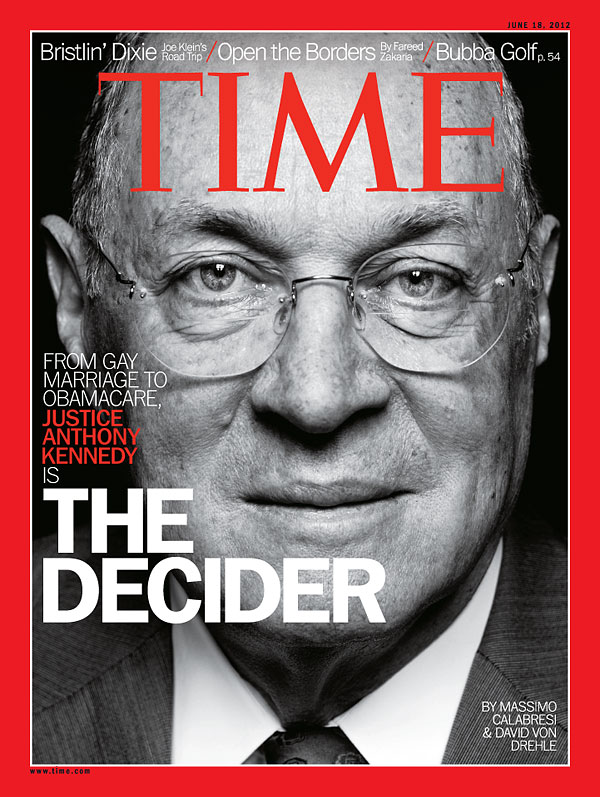
Supreme Court Justice Anthony Kennedy announced Wednesday that he will retire in July — a decision that will leave the court without his pivotal swing vote and give President Donald Trump the opportunity to nominate a replacement who could shift the court further to the right.
“It has been the greatest honor and privilege to serve our nation in the federal judiciary for 43 years, 30 of those years on the Supreme Court,” Kennedy, 81, said in a statement on Wednesday.
Kennedy was nominated by President Ronald Reagan in 1987. During his 30 years on the Supreme Court, Kennedy became a deciding vote on some of the most controversial Supreme Court rulings, including the legalization of same-sex marriage in 2015, the Citizens United decision on campaign finance in 2010, and cases involving abortion rights.
In June 2012, ahead of a landmark ruling on Obamacare, Kennedy appeared on the cover of TIME, labeled “The Decider.” “It is easy to forget that there is still a wide range of issues before the Justices — dull but important matters like pension-fund law, for example — that can be resolved amicably, without need for Kennedy’s deciding vote,” TIME’s Massimo Calabresi wrote then. “But on most cases of great moment, the intellectual battlefield of the Supreme Court has shrunk to the space between this one man’s ears.”
The cover story preceded Kennedy’s role in striking down the heart of the 1965 Voting Rights Act, legalizing same-sex marriage and upholding Trump’s travel ban — all of which were 5-4 decisions in which he sided with the majority.
Efforts to fit Kennedy’s major opinions into a clear, coherent philosophy have met with little success. He generally sides with the court’s conservatives but is not tethered to any particular constitutional doctrine. ‘There is no grand unified theory for Justice Kennedy’s jurisprudence,’ says Viet Dinh, a leading conservative court watcher whose law partner Paul Clement argued the case against Obamacare. Liberals are relieved there’s one Republican nominee on the court whom they can reach with their arguments.
‘It is important to have someone who approaches each case with an open mind and who agonizes about trying to make the right decision, instead of trying to fit the case into some formulaic box,’ says Neal Katyal, Obama’s former Solicitor General. Kennedy is often compared to his former partner in the middle, retired Justice Sandra Day O’Connor.
But whereas O’Connor carefully crafted narrow rulings for individual cases, leaving tomorrow’s decisions for tomorrow, Kennedy has a fondness for grand and sweeping statements — like this one from his controversial ruling in the Citizens United campaign-finance case: ‘independent expenditures, including those made by corporations, do not give rise to corruption or the appearance of corruption.’ Never? With this broad generalization, which seemed to go beyond the specific question of free speech at the heart of the case to bless every variety of so-called independent expenditure — including those not yet dreamed up by Washington pols — Kennedy opened the door to the very super PACs that now seem hell-bent on proving him wrong.
That year, Kennedy was also named to TIME’s list of the 100 most influential people in the world.
At the time, Theodore B. Olson, who served as solicitor general of the United States under President George W. Bush, wrote about Kennedy’s “indelible and enduring stamp on American life and institutions.”
“So crucial is his vote that lawyers regularly pitch their arguments in close cases overtly to Justice Kennedy,” Olson wrote. Read the rest of his write-up about Kennedy here:
Supreme Court Associate Justice Anthony Kennedy may be the most influential person in American life today.
His court routinely issues decisions affecting life, death, liberty, speech, religion, property, voting, war, treaties and terrorism. Roughly one-fourth of those decisions — usually the big ones — are close calls, with the court dividing 5–4 and Justice Kennedy, 75, siding sometimes with his liberal colleagues and sometimes with the conservatives, nearly always being the decisive vote. He has been the swing vote in the court’s abortion, death-penalty, discrimination, campaign-finance and criminal-procedure cases. One year, in fact, he was 24 for 24 in 5–4 cases. So crucial is his vote that lawyers regularly pitch their arguments in close cases overtly to Justice Kennedy.
In the nearly 25 years since his appointment, over the course of five presidencies, Justice Kennedy’s convictions and unique sense of liberty, equality and justice have placed an indelible and enduring stamp on American life and institutions. President Obama’s signature health care legislation, and possibly his re-election next November, may stand or fall based on Justice Kennedy’s vote in the case, argued in March, that will likely be decided in June.
More Must-Reads from TIME
- Breaking Down the 2024 Election Calendar
- How Nayib Bukele’s ‘Iron Fist’ Has Transformed El Salvador
- What if Ultra-Processed Foods Aren’t as Bad as You Think?
- How Ukraine Beat Russia in the Battle of the Black Sea
- Long COVID Looks Different in Kids
- How Project 2025 Would Jeopardize Americans’ Health
- What a $129 Frying Pan Says About America’s Eating Habits
- The 32 Most Anticipated Books of Fall 2024
Write to Katie Reilly at Katie.Reilly@time.com